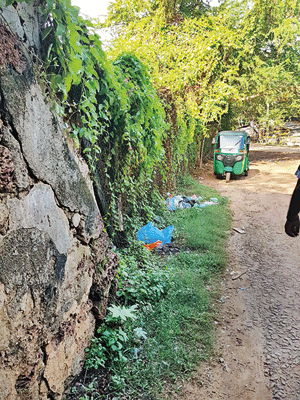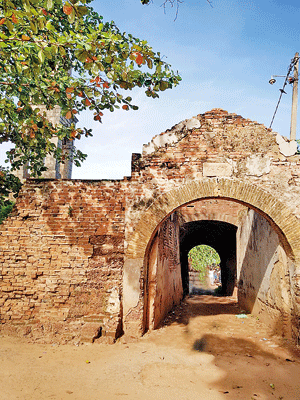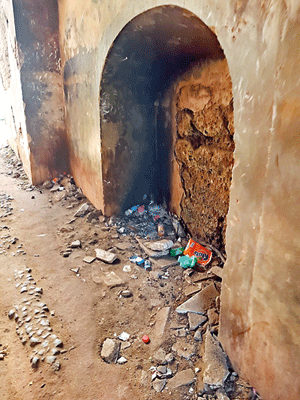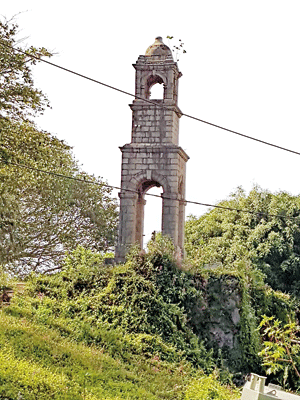Letters to the Editor
View(s):Solution to poor get nothing, the rich get Prison Hospital
Here is a solution to the prison hospital problem where the rich and powerful enter faking illnesses to avoid being with the poor and the downtrodden in over crowded and not so comfortable conditions in the prisons. As most of the prisoners would like to spend time in the prison hospital, why not convert the entire prison to a hospital ward where the Doctors will visit them individually and treat them like at the general hospital. Otherwise it is not fair by the people who do not have social status and influence to enter the prison hospital.
There may be hundreds having high blood pressure and diabetes in our prisons and they languish in prison wards under difficult conditions because they are poor in every sense of the word.Here I am reminded of the proverb ‘Duppathkamath waligeya nethi gona weni’’ (poverty is like a bull without a tail). Anyway it appears that the poor have a better backbone than the rich as they don’t fake illness to enjoy prison hospital comforts.
Gone are the days where acts of bravery were displayed by prisoners like Weera Puran Appu, Madduma Bandara and Henry Pedris. The weak resort to behaviour unthinkable in civilized society to pervert justice insulting even their parents, children and the schools they studied.
A. G. Weerasinghe Via email
This is the calibre of public servants we need
I refer to your ‘Sunday Punch’ article by Don Manu last Sunday in your esteemed journal on the crime committed by the former Secretary to the President and the punishment meted out to him and one other
When many of us heard the news that the former Secretary to President, had been sentenced to three years in prison and a huge fine on top of that, I am sure most of us were shocked. Here was a public servant who had served the state for over 35 years, held a number of top positions in the public service and then been appointed the secretary to the President, and now was being punished for following the orders he received.
What went wrong?
Public servants must take note. With all the corruption we saw in the previous regime and which sadly continues in the current government, they will be called upon to dance to the tune of these corrupt politicians. They do not have to follow illegal orders.
As I read this article, I was reminded of a distinguished public servant whom I had the good fortune to meet, who always stood his ground and refused to do what was wrong or illegal. I will not mention his name but those readers who were former public servants and the older readers of my letter, will probably remember.
He was a man of integrity who held many top positions in the public service. He served as a Permanent Secretary in many ministries in almost all the post independence governments and retired in the early seventies. After retirement he joined a large mercantile establishment as its Chairman/ Managing Director. When J.R. Jayewardene won the general election in 1977, this gentleman was invited back to the public service by the Prime Minister JR . He was appointed the Secretary to the Ministry dealing with fuel, where the minister was Cyril Mathew. Evidently there was much to be done in this ministry to eliminate many corrupt practices, and he did this without fear or favour. He did not always listen to his minister, and carry out all the orders he received. The minister found him very difficult, and requested the President JRJ, to move him out of the ministry.
The President did so and then appointed him Chairman, Education Services Commission. This was a new Commission that had been established to regularize the employment and transfers of teachers among other tasks to protect and promote the employment of teachers and others in the field of education. During this time there was much political interference in teacher/ principal appointments and transfers. This gentleman worked on the policies and procedure for all such tasks and had them approved.
One day he received a call from the Secretary to the President , who wanted a teacher transferred in or out (I cannot now remember!), of Royal College. He had politely refused to do so as it would be against all the procedures now in place. Soon thereafter he received a call from the President himself, who was now speaking on behalf of his secretary, and wanted this done. His answer again was a polite no to the ‘big boss’. I believe some pressure was now used on him, but he did not flinch. The President reminded him who exactly he was, the first Executive President of SL. He insisted that his secretary’s request must be granted.
This great gentleman wrote his letter of resignation and had it delivered to the President’s office, and went home, with his “head held high and honour intact”. This was his response.
The episodes recounted here were personally related to me by this great gentleman, one of the finest persons I have met in my life.
Eksith Fernando Dehiwela
Negombo’s heritage left to rot?

St. Stephen’s Church
It is nothing in scale compared to the Galle Fort ramparts and one can easily miss this little patch of colonial history– the remains of the fort in Negombo. Built by the Portuguese and then modified by the Dutch, the British apparently destroyed most of the fort and used the bricks to build a prison.
A clock tower built by the British in commemoration of Queen Victoria’s Jubilee celebrations in 1887 stands atop of what remains of the fort.
But it isn’t the size of the fort that disappoints you as much as the sheer neglect of the area; plastic bottles and sili sili bags strewn around the entrance and foliage left to grow wild.
On a visit there on Sunday, an unsightly, foul-smelling garbage dump on the path to both the remains of the fort and the prison premises greeted us after we nearly missed the dirt road turn-off as there was no visible signboard. When we asked a local the way to the ‘kotuwa’ he seemed bemused.
With the quaint-looking Dutch period church, St. Stephen’s — built apparently on an artificially mounted hill — in the vicinity of the fort ruins, a little bit of maintenance and planning could turn this small spot into a picture perfect heritage site for all to enjoy, after a visit to the bustling Negombo fish market close by. Perhaps, the plan could include a terraced garden leading to the fort clock tower and more importantly proper garbage disposal.
A disappointed sight-seer Colombo




‘Eliya’s’ move to shut down new
Constitution far from enlightened
Even though a draft of a new Constitution has not yet been published, ‘Eliya’ has declared it is totally against it. Specifically they say they are against formulating a new Constitution just because of the people who had initiated the formulating process.
However, if a new Constitution is not drafted, the existing Constitution of 1978 (with its 19 amendments) prevails as the default document. That Constitution was formulated by the very government and personalities who are the subject of intense criticism by the “Eliya movement”!
For all its challenges, this Constitution making process has attempted to be more inclusive, than previous Constitution-making processes, by consulting the public and opening the process to a Parliamentary Select Committee process, and engaging with all the political parties in Parliament. It has specifically engaged with the minority community and that is surely important if there is to be healing, nation building and reconciliation after a bitter thirty year conflict.
A whole generation has emerged since Provincial Councils came into being in 1987. To them, Provincial Councils are not threatening. The country has not fragmented and many (in the South as well) believe that they could do better with more powers and responsibilities devolved to the provinces. This generation may want a voice in deciding whether there should be a new Constitution and what it should contain.
To shut down such a process before it even yields proposals to be discussed and to believe that the changed circumstances do not warrant new responses may not be the most enlightened actions to take.
Sakuntala Kadirgamar Via email


